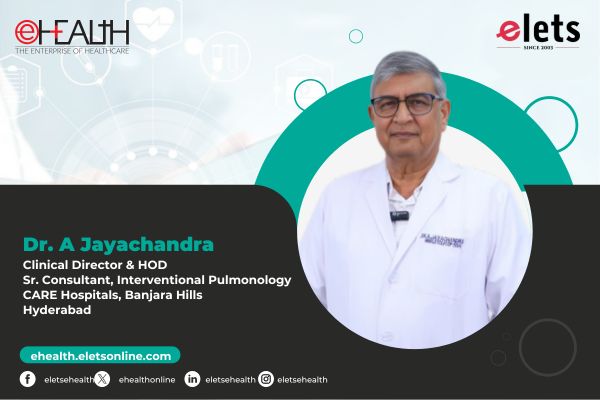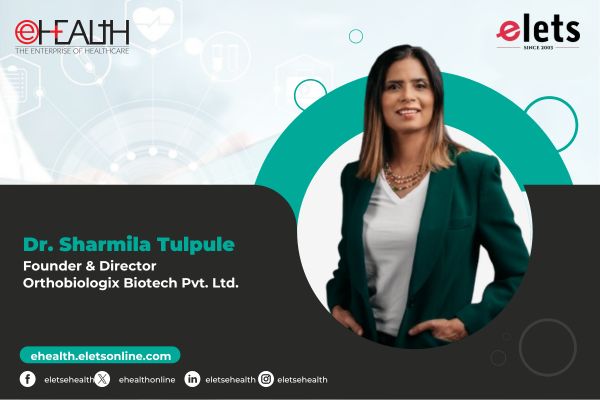
CII’s Delhi Chapter Health and Wellness Committee co-chair Dr. Ravi Gaur, Principal Advisor Spice Health (Spice Jet Promoters Venture), spoke about transforming labs to foster breakthrough innovation at the second Elets Diagnostics Leadership Summit.
Emphasizing that pathology is the motor that drives healthcare to understand diseases, Dr. Ravi Gaur, called for a change in the functioning of pathology labs. He averred that the need of the hour is to digitally empower the lab with state-of-the-art technologies and make them globally connected powerhouses, capable of breakthrough innovation at scale and delivering service for the best clinical outcome.

He further added that Lab transformation is inevitable. ‘With a growing focus on new assay development, research, new technology evaluation, genomics, proteomics, and digital pathology ecosystems, the labs have to gear up for the computational future and bring latest innovations & advanced concepts for the benefit of clinicians and patients. Previously inaccessible and complex assays should be automated fully and made available routinely. Quality, accreditation, and skills have to be integrated into the DNA of each lab.’

In addition, he stated that digital technologies could make pathologists’ jobs more efficient and scalable, allowing for faster and more accurate diagnoses for patients. He stressed the need for providing a modern, quality driven approach to laboratory operations that offer consumers unprecedented convenience, impactful innovations, and reliability with advancing technology revolutions.

Dr. Gaur feels – ‘The future is near-patient or home diagnostics, in which phlebotomists can perform testing and deliver results immediately. We can probably foresee a state-ofthe-art, standardized system for clinical diagnostics facilitating immunoassay, serology, clinical chemistry, microbiology, clinical microscopy, hematology, cytopathology, transfusion, and molecular testing. A series of advancements are poised to change the industry’s testing paradigm through speed, quality, efficiency, and scalability to help guide care for patients’.

He further mentioned how innovative technologies have not only made POCT devices portable but have also improved specimen collection techniques that facilitate minimal interference. This technology is relatively user friendly because of advances in disposable test cartridges and microprocessor-based analyzers. He shed light on how home testing is another growing segment that is redefining laboratories. ‘It is decentralized, where test results are provided manually by patients or entered into shared data-monitoring systems. These home testing kits are relatively inexpensive and over-the-counter diagnostic.’
Additionally, he stressed that future labs are all set to enable patients to take a more active role in their own care by integrating instant at-home testing into their medical regime. ‘It will not be surprising to welcome a time when patients will be able to add important information to their medical records through digitally linked hand-held devices designed for home use. The future labs will give tough competition to sophisticated hospitals and independent laboratories, especially in light of the growing number of endemics and complex tests’.
He also talked about how clinical labs are in the midst of a technological revolution that is focused on increased efficiency, improved quality, and reduction in errors in the delivery of health care services. Automation of many laboratory services will result in major shifts in laboratory staffing needs. He stated that the demand for experts to monitor and service robotic equipment, skilled IT professionals, and allied healthcare professionals is likely to grow.
Additionally, he mentioned how the healthcare system is increasingly recognizing the additional role that laboratories can play in becoming a clinical decision engine, allowing patients to run tests at home and doctors to interpret the results and diagnose and monitor patients with greater accuracy and speed.
‘As we enter the post-pandemic era, pathology labs have to adapt to the mounting pressures. With multiple challenges including quality, new investments in technology, declining profit margins, pricing, growing customer expectations, statutory compliances, pressure on reimbursement, etc labs are experiencing multiple challenges, and they must look for new strategies to succeed’ – asserted Dr. Gaur.
According to him, in order to transform diagnostic laboratory tests in this new era, we must adopt strategies designed to deliver fast and quality tests, facilitate home tests, and reduce unnecessary and non-contributory testing. The advances will make it easier to build strategies for disease prevention and early diagnosis. ‘The goal is to optimize the health of the population in a cost-effective and sustainable manner’ – concluded Dr. Gaur.
Be a part of Elets Collaborative Initiatives. Join Us for Upcoming Events and explore business opportunities. Like us on Facebook , connect with us on LinkedIn and follow us on Twitter , Instagram.
"Exciting news! Elets technomedia is now on WhatsApp Channels Subscribe today by clicking the link and stay updated with the latest insights!" Click here!
















